Eczema is a chronic skin condition causing redness, itching, dryness, and inflammation. In this comprehensive guide we will provide you with everything you need to know about eczema, from its causes and symptoms to the best treatment and prevention strategies.
By the end of this guide, you’ll have a clear understanding of:
- The different types of eczema
- What triggers flare-ups
- How to treat eczema with medical and home remedies
- Preventive measures to reduce flare-ups
What is Eczema?
Eczema, also known as atopic dermatitis, is a condition that causes the skin to become dry, itchy, inflamed, and irritated. It is not contagious, but it can significantly impact a person’s quality of life, leading to discomfort and, in severe cases, skin infections.
How Common is Eczema?
- Worldwide: Eczema affects about 15-20% of children and 2-10% of adults globally. (WHO)
- Africa: Studies suggest that eczema prevalence in African countries varies between 4% and 25%. (NCBI)
Types of Eczema
Eczema is not a one-size-fits-all condition; there are several types, each with its unique characteristics:
1. Atopic Dermatitis (Most Common Type)
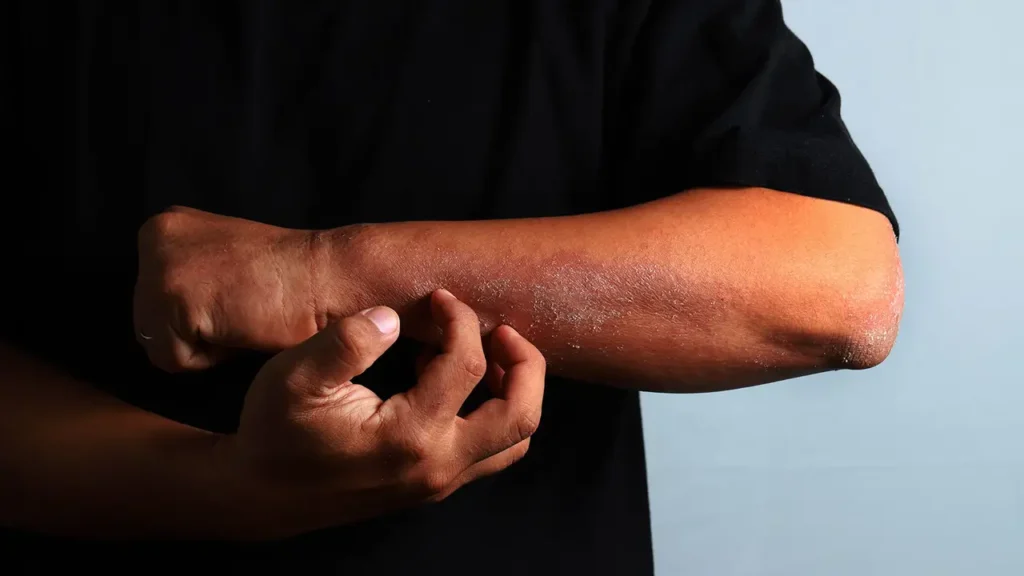
- Symptoms: Dry, itchy, and inflamed skin; common in babies and children.
- Triggers: Genetics, allergens, irritants, and a weakened skin barrier.
2. Contact Dermatitis
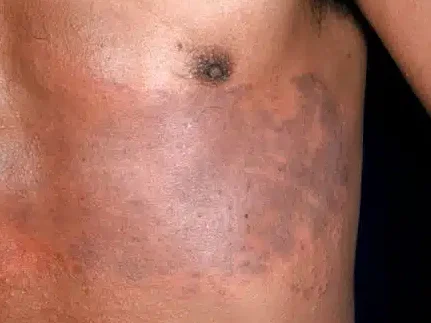
- Symptoms: Redness, irritation, and blisters after contact with an irritant or allergen.
- Triggers: Soaps, fragrances, detergents(like your washing powder), and certain metals (like nickel).
3. Dyshidrotic Eczema
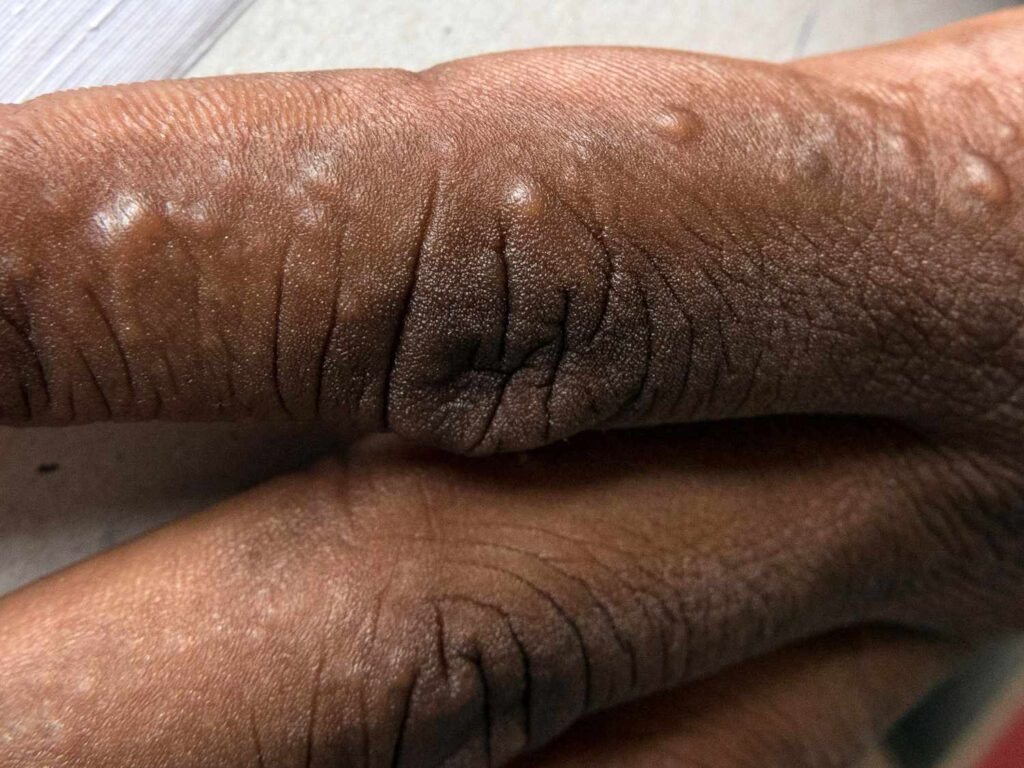
- Symptoms: Small, itchy blisters on hands and feet.
- Triggers: Stress, allergies, and exposure to metals like cobalt or nickel.
4. Nummular Eczema
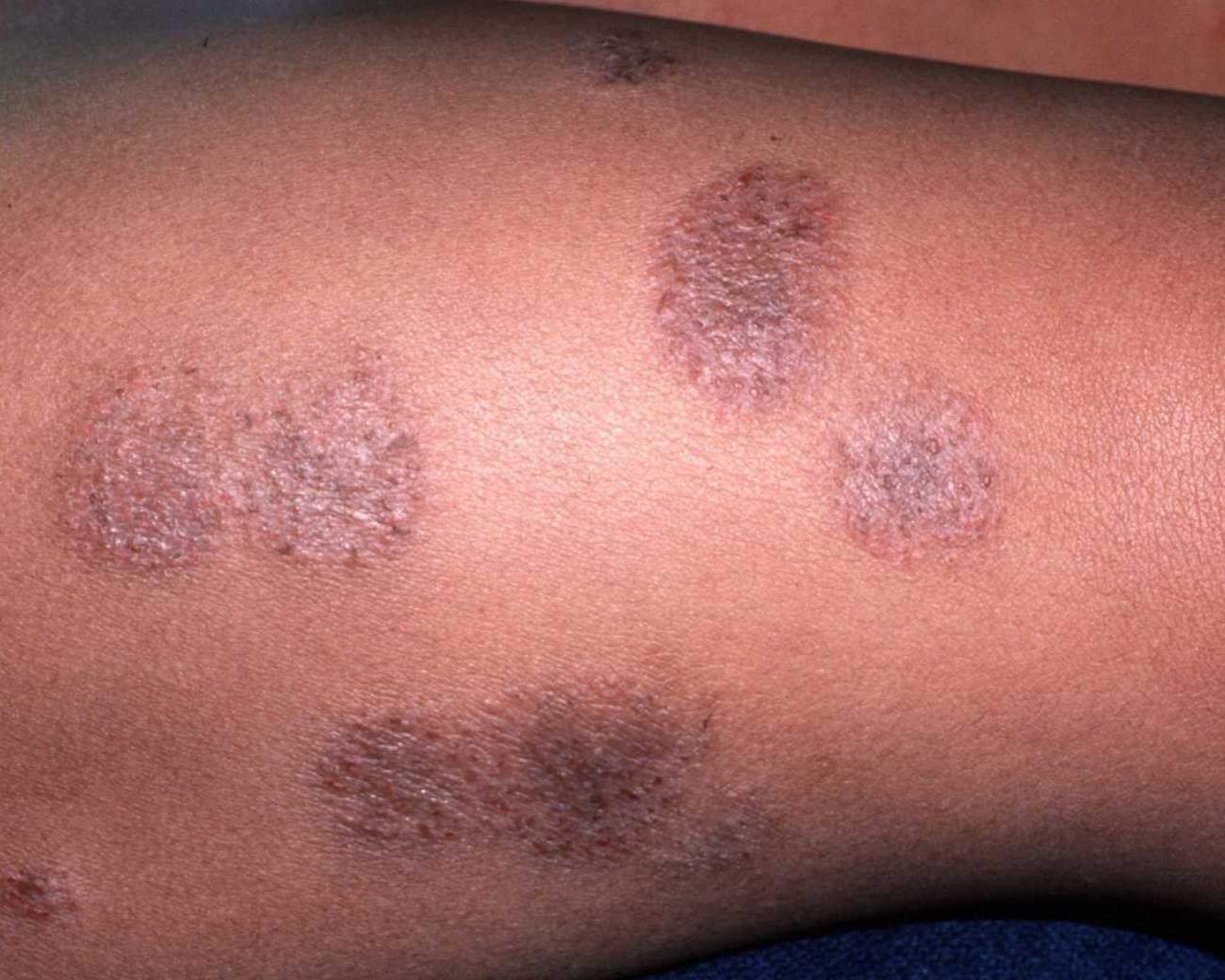
- Symptoms: Round, coin-shaped spots of irritated skin.
- Triggers: Dry skin, insect bites, or skin injuries.
5. Seborrheic Dermatitis
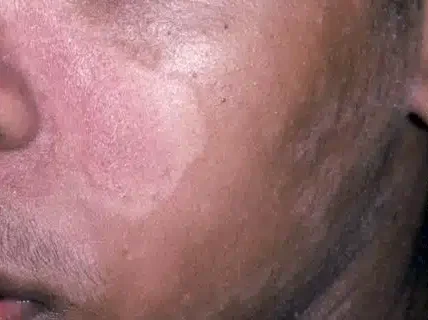
- Symptoms: Scaly, greasy patches on the scalp, face, and chest.
- Triggers: Hormonal changes, stress, and yeast overgrowth.
6. Stasis Dermatitis
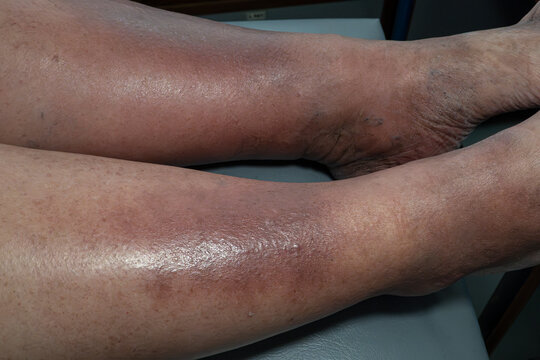
- Symptoms: Swelling and skin discoloration on the lower legs.
- Triggers: Poor circulation, varicose veins, and blood flow issues.
What Happens in the Skin When You Have Eczema?
Eczema is like a glitch in your skin’s defense system. Normally, your skin acts as a strong barrier, keeping moisture in and harmful stuff like bacteria, allergens, and irritants out. But in people with eczema, this barrier is weak and leaky, leading to dryness, irritation, and inflammation.
Here’s a simple breakdown of what happens:
- Weak Skin Barrier:
- Imagine your skin is a brick wall. In eczema, some of the “bricks” (skin cells) and “cement” (natural oils) are missing. This means moisture escapes too easily, and irritants can sneak in.
- Overactive Immune Response:
- Your immune system mistakes harmless things (like dust, soaps, or even stress) as threats and attacks your skin.
- This leads to redness, swelling, itching, and rashes.
- Inflammation and Itching:
- The immune response releases chemicals that make the skin even more irritated.
- This causes intense itching, which makes people scratch—damaging the skin further and worsening the cycle.
- Bacteria and Infection Risk:
- Because the skin barrier is weak, bacteria and germs can enter more easily, increasing the risk of skin infections.
- Chronic Flare-Ups:
- Eczema doesn’t stay the same every day. Some things—like stress, cold weather, or scented products—trigger flare-ups, making symptoms worse.
In summary, eczema is a combination of weak skin, an overactive immune system, and inflammation.
Common Causes & Triggers of Eczema
While the exact cause of eczema isn’t fully understood, researchers believe it results from a combination of genetics and environmental triggers.
1. Genetic Factors
- If one or both parents have eczema, asthma, or hay fever, their child has a higher risk of developing eczema.
- A mutation in the filaggrin gene, which helps maintain a healthy skin barrier, has been linked to eczema.
- You destroy your skin barrier when you
- Overuse exfoliants and chemical peels
- Use strong cleansers
- Use alcohol based products on your face
- Frequent washing with hot water (depletes moisture)
- prolonged sun exposure
- Dehydration
- Poor sleep
- Excessive Caffeine
2. Environmental Triggers
- Allergens: Pollen, pet dander, dust mites, and mold.
- Irritants: Harsh soaps, detergents, and fragrances.
- Climate: Extremely hot or cold weather, humidity, and dry air.
- Stress: Emotional stress can weaken the immune system, worsening eczema symptoms.
- Hormones: Hormonal changes during pregnancy, menstruation, or menopause can trigger flare-ups.
Symptoms of Eczema
Eczema symptoms vary from person to person and can range from mild to severe.
Common Symptoms Include:
- Itching: Often intense and worse at night.
- Dry, cracked skin: Can become rough and scaly.
- Red or inflamed patches: Common on the face, hands, elbows, and knees.
- Blisters or oozing skin: More common in severe cases.
- Thickened skin: Prolonged scratching can lead to lichenification (thick, leathery skin).
How to Treat Eczema
1. Medical Treatments
Doctors often recommend the following treatments for eczema (Note they can have pretty severe side effects if not taken under the guidance of a doctor):
- Topical Steroids (Corticosteroids): Reduce inflammation and itching.
- Moisturizers & Emollients: Maintain the skin barrier and prevent dryness.
- Antihistamines: Help relieve itching and improve sleep.
- Calcineurin Inhibitors (Tacrolimus, Pimecrolimus): Used for sensitive areas like the face and neck.
- Oral Medications: In severe cases, immunosuppressants like cyclosporine may be prescribed.
2. Home Remedies & Natural Treatments (These are not scientifically proven but they have been reported to help).
- Oatmeal Baths: Helps soothe itchy, inflamed skin.
- Coconut Oil: Contains anti-inflammatory and antimicrobial properties.
- Aloe Vera Gel: Hydrates and calms irritated skin.
3. Lifestyle Adjustments to Manage Eczema
Eczema can be managed effectively with lifestyle modifications that reduce flare-ups and maintain skin health. Here’s how:
A. Use Fragrance-Free Soaps and Lotions
Fragrances and harsh chemicals in skincare products can trigger flare-ups.
Instead:
- Opt for hypoallergenic, fragrance-free cleansers and moisturizers.
- Look for products labeled “dermatologist-recommended” or “for sensitive skin.”
- Apply a thick moisturizer immediately after bathing to lock in moisture.
B. Wear Loose-Fitting, Cotton Clothing
Tight or synthetic fabrics can irritate sensitive skin and worsen symptoms.
Instead:
- Choose soft, breathable fabrics like cotton and bamboo.
- Avoid wool and polyester, which can cause friction and itching.
- Wash new clothes before wearing them to remove potential irritants.
C. Avoid Long, Hot Showers
Hot water can strip the skin of its natural oils, worsening dryness and irritation. To protect your skin:
- Take lukewarm showers for no longer than 10-15 minutes.
- Pat the skin dry with a soft towel—do not rub.
- Apply moisturizer within 3 minutes of drying off to seal in hydration.
D. Keep Your Home Dust-Free
Dust mites, pet dander, and mold are common environmental triggers. To reduce exposure:
- Sweep and dust regularly to minimize allergens.
- Use air filters to remove airborne irritants.
- Wash bed sheets, pillowcases, and blankets weekly in hot water to eliminate dust mites.
E. Manage Stress and Get Enough Sleep
Stress and lack of sleep can weaken the immune system and trigger flare-ups. To manage stress:
- Practice mindfulness, yoga, or deep breathing exercises.
- Create a consistent bedtime routine to improve sleep quality.
- Engage in light exercise like walking or stretching to relieve tension.
F. Stay Hydrated and Eat an Anti-Inflammatory Diet
Hydration and nutrition play a crucial role:
- Drink plenty of water throughout the day to keep skin hydrated.
- Eat foods rich in omega-3 fatty acids (salmon, flaxseeds, walnuts) to reduce inflammation.
- Avoid processed foods, excessive sugar, and dairy (if it worsens your eczema).
Preventing Flare-Ups
While eczema cannot always be prevented, these steps can help reduce flare-ups:
1. Maintain Proper Skincare
- Apply a thick moisturizer twice daily.
- Use a gentle cleanser (avoid soaps with sulfates).
2. Manage Stress Levels
3. Diet & Nutrition
- Eat anti-inflammatory foods (e.g., salmon, turmeric, leafy greens).
- Stay hydrated to keep skin from drying out.
Final Thoughts
For some, eczema improves with age. However, many people continue to experience flare-ups throughout adulthood.
Eczema can be challenging, but with the right skincare routine, lifestyle changes, and medical treatments, you can effectively manage symptoms and prevent flare-ups.
Additional Resources
📌 Watch: Eczema Skincare Tips
📌 Listen: Eczema Podcast on Spotify

